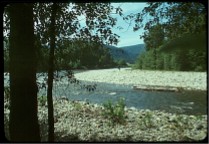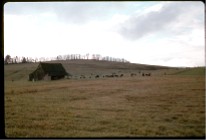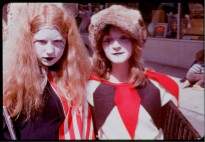Life at the Lake
a diary of living at a small lowland lakeWHAT IT'S LIKE

Early moonrise over Lake Ketchum
|
Archive Search |
| Links |
|
and s-integrator |
Silvia

Tulip Festival in Nearby Skagit Fields,
Two breeding pairs of buffleheads are back on the lake, the male in close attendance on the female. They have been gone since February. He is a brilliant black and white, as though designed by a senior in a good graphic arts program. His body glows with seeming iridescence, the white heliographing from a considerable distance. The black is jet.
That design student got it just right. The classic white triangle on its domed head. The tiny beak. The gleaming black eye (brown and yellow there, too), with red at its center. When the student was done with the gaudy male, there was a bit of white tempera left over.
The female bufflehead was drab, dull, dun. Two shades of brown in subtle contrast. Most people would miss them. She'd blend in with all the other females of various species on the lake. Nobody would know she was a bufflehead unless they spotted him less than a meter away. She needs something to brighten her up. A dab of the brush loaded with the remaining white tempera might do it. There, just below each eye. The student is done with his work.
Perfect! An 'A,' I'd say.
- - Comments ()
...

North Fork Stillaguamish Camp
I maintain that anybody (well, nearly anybody) could live the life of great simplicity that Thoreau advocated, and sometimes practiced, and I graded sorority girls down on, if they said it wouldn't be possible today.
One man I knew who practiced the concept, in the literal manner of Thoreau, was Poet Robert Sund. He and Charlie Krafft and some others lived for up to ten years in a series of fishermen's shacks at the mouth of the Skagit River, in Washington State. They had to haul drinking water from a few hundred yards away and had no electricity. They practiced a most stringent form of Economy. They wrote pretty good poetry, practiced the ancient art of calligraphy and Sumi painting, smoked a lot of grass, laughed often, and were visited regularly by women sympathetic to their cause, that being the life of "love and idleness," that Poet Ezra Pound sang so well about.
Ah, for those sympathetic women: Thoreau had none of them as visitors. Only Emerson, who invited him into Concord for Sunday dinner, or rode out to provide him with a chicken for his own pot.
I tried it myself, half-heartedly, a little insincerely, it seems in retrospect, though at the time I was honestly determined to work at it. But I didnt; I too easily copped out. I had a riverfront lot on a fine fly-fishing stream; I brought in a used 16-foot travel trailer. Its name was Aristocrat, and I liked the irony. It was pretty crude. It had a two-burner leaded-gas stove and I bought a Coleman lantern to give me light. That was all that I needed, or so I thought.
True, I lived in the city, Seattle, and this was merely a weekend retreat. But I thought I could put the principles of Thoreau to work and live a life of greater simplicity. And I did. But, bit by bit, I added to my modern-day equivalent of his one-room cabin. I brought in a battery-powered radio that would also play cassette tapes of my favorite music—at the time, Joni Mitchell and, her odd companion, Mozart. I drank jug water brought in from the city.
After a while, I decided to add a waterline to my agreeable neighbor's well. Then it was electricity. Though the trailer had a roomy bed, there was no space for my wife and son. So I traded the travel trailer for a two-bedroom mobile home, also used.
Soon came a TV dish so that, when rained in, we had some continuous form of entertainment, aside from reading. (Love those pro basketball and baseball games, with the rain drumming on the aluminum overhead.) And soon I realized that, with a telephone now linking us to our answering machine in the city, I had replicated my urban environment down to the letter.
I could sense HD frowning over my shoulder. And what a mighty frown he had! So I decided to get rid of it.
- - Comments ()
...

Lily, Perhaps from Walden Pond, but Probably Not
I was chatting with Henry David Thoreau yesterday, trying to explain to him what a "blog" was, and that it was a modern-day equivalent of the diary or journal, with which he was highly familiar. The Web, or Internet, he had more difficulty with, and his was one of the best minds of his time, or any other time, for that matter. I had said that a blog could be read almost instantaneously, all over the world. This he doubted; I could read it in his eyes.
"You write it down, see," but he interrupted me. Well, he was known for doing this often, the big know-it-all.
"You write it down on paper, in your ledger, or journal book?" he said, or rather asked.
"Not exactly. Well, you can start there, but most bloggers write it down on their computer, probably in Microsoft Word, for starters."
Again his hand went up, halting me.
"A computer is something that computes. It adds up sums?" he asked.
"Sort of, but you can write on it, too, and you can save it."
"'A penny earned' sort of thing?"
I nodded sickishly.
"And that Microsoft. It is from the Latin, meaning a very small thing that might be described as 'squishy.' Is that not right?"
"Right," I lied; it meant just the opposite. "In the world of computers there are servers."
"That which serves others?"
"Close enough. And there is a giant Server, and it is a kind of relay station, one on the East Coast and one on the West. Actually, there are servers and relays, all over the world."
"Amazing," he said, and I could tell the words were heart-felt. "Go on. You write down your daily entry. . . ."
"Or log, or Blog," I corrected him.
"Yes."
"You can write it down on paper first, but you can also keyboard in your daily entry." And here I wisely stopped and gave him a glimpse of my keyboard. He studied it closely.
"You have the letters of the alphabet grouped strangely. The alphabet evenly divides into thirteen letters, or characters. Why not put half of them on one side of what you call the keyboard, and the other half—M trough Z—on the opposite side? It seems simpler and more economical."
"Because it has been done this other way—qwert yuiop—for more than a hundred years."
"And people can work efficiently this way?"
"You'd be surprised."
"I am surprised by many things you tell me that I have not seen with my own eyes. Mirable dictu. That means . . . ."
"I know what it means," I said, "though I have little Latin and even less Greek. If you keep interrupting me, I'll never finish and you will never know what you need to know."
HD looked truly sad and repentant. "It is a bad habit of mine. Forgive me?"
"There is nothing to forgive, Henry." I smiled.
"So this blog of yours, it goes all over the world? Does the Moor see it?"
"If you mean people in the Muslim world, yes. But they are pretty busy these days fighting us off."
He did not inquire further into what I meant and pressed on with his intellectual interrogation. A stream of question was fired at me as though from a machinegun. I dodged the bullets as best I could. HD knew about the telegraph, but not the telephone. Quickly I glossed over the radio. TV, I said, was merely a visual extension of the radio. Decades flew by in my descriptions. We came to the computer, which I had touched upon moments earlier, and I elaborated a bit on the Web.
With one of those dry witticisms which he was famous for, he interjected, "I suppose a Spider sits in the center of the Web?"
"Exactly," I agreed, "only they usually call him or her, the Webmaster now."
And I briefed him on hand-writing-recognition word processing and voice recognition, though I said both were a long ways from being perfected. Both made too many errors to be useful.
He looked disapproving, but I could see he was processing the ideas rapidly and considering technological advents much as he would the startling concepts of the Trinity or Ego, Id, and Super Ego. He was a Transcendentalist to the bone. This made it possible for him easily to grasp the ideas of electricity and radio waves. I decided not to tell him about satellites orbiting the earth. They might frighten him. Another day, perhaps.
HD said, "And the Moor reads your blog? And the Russian, the Spaniard, the Negro in Africa, the Samurai in Japan? All those different people? A nano-second after you have written and what-you-say, published it, on line? They all can read it?"
"Well, some of those people use the Internet,"I agreed, "and some of them will read the blogs written by total strangers, yes."
"How wonderful, though a bit daunting. If, in my day, we had such a thing, people would have read my Journals. They would have been transmitted everywhere. They would not have been left hidden away in a drawer in my study."
"But the Journals were published, Henry. In 1906."
"That did me no practical good, though it is some consolation. I thank God for that, if there is one, and with whom, if there was a reason to thank him, I have never quarreled. And, you say, I am widely read today?"
"I wouldn't say 'widely,' HD. But, yes, you are read. Mostly in high school, though. Your book, Walden."
"And you and your blog, they are read more?"
"Well, they are readily available to anybody who has the inclination. But people say they don't have time to read anymore."
"In my day, too. Too busy farming and shoeing horses." He sighed heavily, and his thick features formed an image of glum repose. "But you and what you write are read all over the world?"
"Theoretically, yes. But with such ubiquity," I replied, "I doubt whether anybody reads my blog at all."
Then, said HD, visibly brightening, "We are rowing in the same boat."
- - Comments ()
...

Thoreau lived in just such a rural environment
I profess, Thoreau was the first American blog writer. True, there wasn't the Internet yet, but if there were Old Henry would have understood its principles quickly and—more importantly—its implications. For his Journals were unpublished during his lifetime and didn't see the light of everybody's day until 1906, when, in 14 volumes, they came blindingly forth. Since then they have been occasionally published.
He began them in 1837, and kept them coming forth until his death. Emerson recognize their importance and tried to get their mutual friend, Channing, to at least print a selection from them during the poet and essayist's lifetime, but it never happened. One doesn't know how disappointed Thoreau was, for the joy of a blog—I mean, journal—is in its keeping, and in the daily recognition of what is important in a man or a woman's life.
Today, all over the world, there are blog writers, and the airways, or the Internet, is crammed with writers who believe what they have to say is of vast significance to the broad world. What arrogance; what a triumph of democracy. Go to Google and do the right kind of search and you are brought face-to-face with massive mediocrity. (I know, I know: the shoe fits.)
If you have $25 or so, you can buy a domain name, or sign up for somebody's hosted blog, and then you can tell the world what you ate for dinner last night, or whether or not you got laid. (Liar!)
Thoreau rarely got laid. And if he did (unlikely), he was not the kind to brag to the whole wired world that he had. He was too busy living life and noting in closely examined detail what went on about him in the world both macro and micro.
When I was an undergraduate (here he goes!) I was a reader for a course in American Lit taught by a man whose name would be a household word for some. Emerson and Thoreau were the principals. Young students—sorority girls, for the most part—became unwillingly acquainted with ideas of non-conformity and civil disobedience that seemed as remote from their personal lives as they could possibly be. Worse, they had to write term papers on such Ideas as Simplicity and Economy.
They wrote mandatory essays on how, today, nobody could live the kind of life Thoreau did at Walden Pond because life was too complicated, rich, and demanding. Thus, they assured themselves of a grade no better than a C- for the course. For it can be done.
Tomorrow: Can one live such a life today? Who can?
- - Comments ()
...

Couple of Clowns in Search of a Webcam
The blog isn't really new, you know. It is new only in the sense that its entries can be transmitted all over the world in the wink of a cursor and in the fact that it can contain state-of-the-art graphics. The rest, well, it is as old as the hills. And the hills are old.
The blog—one of which you are reading now—is nothing more than a wide-ranging daily journal that many men and women have kept for hundreds of years, perhaps millennia. I have kept one for more than thirty years. Samuel Pepys kept his most of his long life; a diary of 69 years. Virginia Woolf kept one; so did John Evelyn, who is not so well known except for students of the journal as art form.
In America Henry David Thoreau is probably the best known diarist. (I'd call him "journalist," except that term is easily mixed up with a reporter who is expected to write a story daily.) Thoreau is best known for his record of a year or so spent on Walden Pond, but his Journals were kept much longer than that, and comprise many volumes. There is probably no man or woman alive who has read every word of them. They are replete with nature observations, quotations from readings in Latin and Greek, and deep thoughts about people and community.
Today the blog (short for Weblog) is in its infancy. It shows signs of immediate mediocrity (including this one). Like the Webcam touched upon yesterday, it tends toward a highly subjective glorification of its owner, or protagonist.
A slender young girl living in a modest apartment taking pictures of herself with a small, fixed-focus video camera as she parades around her computer in various stages of undress, grouping such shots egocentrically in fours, and publishing them online, hopefully for paid subscribers to leer at, with some hints of future pornography, can hardly be said to represent the peak of the art form. The Webcam may soon expire from lack of content and originality, or from failing to deliver with much variety what it grandly promises. Similarly, the blog that dissolves into a daily record of trips to the grocery store, booze imbibed, girls or boys bedded, TV programs watched and dully commented on, amateurish movie reviews, and unoriginal and unacted upon feelings about the war in Iraq will not long be read or watched. You couple the Webcam with the Weblog and you have a prescription for world-wide boredom on the epic scale.
But do not despair. The Webcam and the Weblog have the capability for greatness. Somewhere out there in the vast and disoriented world, with all its warring factions, may be the next Pepys, Evelyn, Woolf, or Thoreau, abudding. And we will first hear from him or her in that most ubiquitous of places—the Internet.
- - Comments ()
...

Typical WebCam Site Featuring Young Bimbo
Popularity of the personal computer and the Internet have made prevalent two new forms of communication; they too highly personalized.
These are the Webcam and the Weblog, commonly called Blog. These are quickly replacing such things as the snapshot and the daily journal, sometimes called the diary. Well, new times call for new methods of communication. Both of these are quicker and faster to disseminate to audiences so wide spread they might be termed "instant, worldwide."
First, the Webcam. This is most problematic. The cheap, tiny camera with narrow fixed focus that can record and quickly transmit amateur pictures from one's computer seems largely centered today on the tiny apartments of twenty-some year old girls, with strong senses of sexuality and limited imaginations.
To my withered eyes, they all look strangely (or not so strangely) the same—long brown hair, fashionable slender young bodies (of which they are inordinately, justifiably proud) and a tendency to run around in bras or less, or in body briefs on which the web camera is fuzzily focused.
I'm not complaining, you understand, even though the subject is usually badly out of focus and not centered in the camera's frame (even though I hate photography badly done). I as much as anybody appreciate the sensuality of these young women, though I tend to get them quickly mixed up, as their daily offerings compound and confuse.
Many of them are tattooed and most of them pierced at least thrice. (There must be a connection with the urge to be facially pierced and showing off oneself on the Internet; some future scholar ought to write his Ph.D. dissertation on this; I have not pat. pend.) Only one ear at a time can usually face the camera, so one presumes that the near ear is a mirror image of the invisible ear, but not always so. Two piercings of one ear are sub-normal; an ear may have five, eight, or twelve separate ornaments. Likewise a nostril, nose, lip, tongue, belly button, or lower nether reach.
Only a few of these piercings currently may be uncovered in various Webcam sites, which are "hosted" (as are Blogs, including this one) by individual websites. Many of these are taking on a commercial bent—but not BlogStudio, at this point. Viewers are urged to go to the girl's individual website and "sign up." This requires a fee, which may be paid with plastic, the number sent by email to the recipient, or performer. How successful this is, I have no idea. But the general idea behind the paid subscription is to make money for the performer so that (again I must presume) that person may move into a larger apartment and, with luck, be able to quit her day-time job.
Lots of luck from this quarter.
There is also the strong hint that, if you subscribe to one of these look-alike female Webcam sites, you will "see more" of the performer. Already on the hosted sites there are hints of what kind of activities may be found, but only for subscribers. There seem to be visual allusions to porno sites and what go on there, which are largely oral activities. On the amateur (and who, in regard to sex, is ever anything more than an amateur?) site can occasionally be glimpsed an enterprising boy friend grinning in the background. I wouldn't call him "pimp", but "aspiring business manager" would no doubt fit. And, also glimpsed, and nicely out of focus, is a quick shot of the performer performing what she promises to perform, for the benefit of the subscriber.
Next: Blogs and what they are saying, or trying to say. Stay tuned in to Lifeatthelake. . . .
- - Comments ()
...

Red Azaleas from the lake garden
This being a Sunday, it doesn't seem inappropriate to have a few religious thoughts, no matter how distant that institution may now seem. Namely, a recent obituary appeared in a Seattle paper. The poem was written by the woman's husband, and is heartfelt, and, no, she was not even an acquaintance of ours, but nonetheless it is deserving of comment—
Her hands created beauty,
In the place she chose to dwell,
Her smile warmed the hearts of those,
On who, by chance, it fell.
Her eyes looked up to Heaven,
Trust and faith in He above,
She took so little from the world
But gave abundant love.
Not bad for an amateur who feels his loss deeply. But an English major does not truly graduate but remains an English major for life: Line six, "trust and faith in He above"--now, really.
He is not the more formal form of the objective case, him or Him, if you'd like, or even if you don't like it. And it is the preposition, in, that determines in a complex sentence what is the object of the verb.
I lay the blame on TV and, in particular, sports announcers, who have made most of us (most of we?) immune to hearing things like, "This is a great day for he and I."
Enough. Enjoy the spring rain and the flowers (including the azaleas above) it brings forth, along with all the garden slugs.
- - Comments ()
...